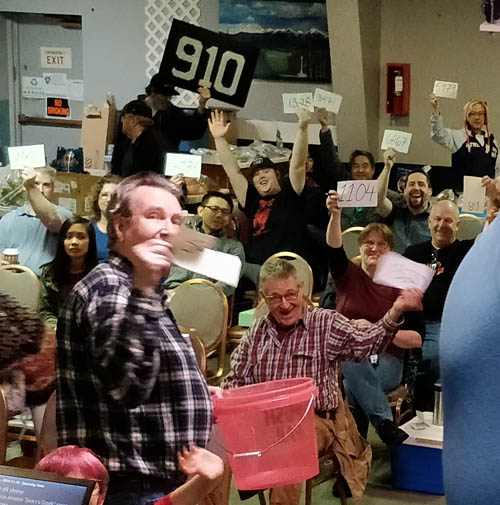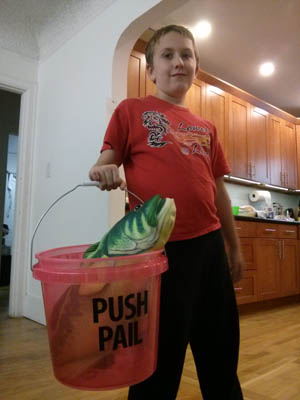
Anyone that has registered may bid.
Please read and follow these guidelines to keep our auctions running smoothly.
About our auctions • Preregister • what others are bringing • everything you ever bought or sold

Anyone that has registered may bid.
Participation:Both GSAS members and non-members may purchase items in a GSAS auction. However,
only GSAS members may receive a split
by selling
items. Anyone may donate items to the club for the auction (thank you!).
Any member (current or former) owing the club money for 30 days or more will be
considered no longer in good standing
, and will not be allowed to
participate in any GSAS auctions. Similarly, members failing to follow these guidelines or the in-person rules may be suspended from participating in future GSAS auctions.
Bidder Registration: To bid
in a GSAS auction, you will need to register at the Sign-up
table. Registrations are good
for that auction only. You’ll receive a white card with your membership or guest number
written on it in big black sharpie so the auctioneer can see it
clearly. Non-members may be asked to surrender their drivers license until checkout.

Look for the Push Pail to bring an item up for bid immediately.
Push Pail: Items are normally auctioned in table order. However, if you are interested in a particular item and are leaving one of the large auctions early, you can move an item into the queue by paying a nominal fee ($1-2). Look for the pink Push Pail
. Sellers may not Push their own items.
Check-out and Payment: You may check out at any time during the auction, at the same station used for check-in. Payment is in cash or credit card, unless you are a GSAS member in which case the Treasurer may accept a check. Once you have checked out, your bidder number is locked, and you may not continue bidding without checking back in first.
If you are a GSAS member in good standing, and want to sell items in the auction,
we encourage you to pre-register your items online. Pre-registering ensures your descriptions are accurate, and includes the option of printable item tags. You may, however,
bypass this step by registering at the Sign-up
table (your items will be entered by the computer operators as they are sold, so descriptions may be terse).

Sellers, please observe the item limit!
Item limits: The maximum number of items that a
GSAS member can sell as a Split
varies from auction to auction (monthly 4-7 lots, big auctions 15-20 lots). A member may sell no more than three lots
of the "same"
item.. Items are considered the "same" if they do not differ substantially from one another (are basically identical).
In the case of live organisms (fish, plant, shrimp, live food, etc.) or previously live (such as wood), items are considered different (not SAME) if they are of different scientific species, or are different Variants of a given species.
For our auction purposes a Variant will be an organism of a given species that differs in color or form enough that it is marketed separately from other Variants of that species.
Examples of Variants include: Gold Platy v. Red Platy, Angelfish v. Veiltail Angelfish, Cryptocoryne wendtii "Green" v. Cryptocoryne wendtii "Bronze", Red Cherry Shrimp v. Blue Velvet Shrimp, Bristlenose Pleco v. Albino Bristlenose Pleco, Zebra Danio v. Longfin Zebra Danio.
You may bring as many items as you wish to donate, but the auctioneer reserves the right to combine similar donated items to speed the auction process along.

No Ziplocs for fish!
Bag etiquette: Fish of all kinds should be bagged (double-bagged is preferred) and rubber-banded in tall fish bags; if you don’t have any handy, your favorite pet store should sell you some. Jars and other containers are okay for small fish and shrimp. NO ZIPLOC BAGS FOR FISH! Small, lightweight plants can be placed in Ziplocs, but if the plant requires a bit of water to stay alive it needs to be in a tall fish bag.

Write information clearly with a Sharpie.
All items placed in the auctions that are to be sold as Splits
must display in clearly-written block text the following pieces of
information:
This information may either be written on the bag in permanent marker only, or you may use a label. There is also an option in the pre-registration process to print out your items as nicely-formatted labels. A lot of folks like to print on normal paper, cut up the "labels" and tape them with pieces of packing taps. It is your responsibility to keep the labels clear, dry and legible. If you feel your handwriting is not clear enough for the auctioneer to read, please ask someone else at the meeting to write it for you. We will provide Sharpies for this purpose (pro tip: writing on the bag before you put anything in it gives much better results!)
Large Fish: If you have an unusually large fish that needs to travel by bucket, make sure to bring along a heater and air stone to keep them alive during the meeting!
Dry goods: Equipment and other non-living items
should also display the same information on masking tape or a label,
and include such descriptions as works
, needs bulbs
, etc.
Dry goods are only allowed at the General and Monthly Auctions. They are not permitted at the Plant Auction.
Seller Split: The seller receives a percentage, or split
of the bid price, with the remainder going to the club
as a donation. We have different rates depending on the auction. For Monthly Auctions,
the seller receives 50% of the selling price. For the Plant and General Auctions,
the seller receives 60% of the selling price.
Sellers do not need to stay for the entire auction to receive payment; the GSAS treasurer will send any unpaid balances after the meeting (check or PayPal).

A giant log goes up for bid!
Minimums: If a member has a high value item that they do not wish to sell below a minimum price, that information must be clearly indicated and marked on the item next to the seller number. The auctioneer will start the bidding at that price. If bidding is accidentally started below the minimum price specified, it is the responsibility of the seller to bring the error to the attention of the auctioneer prior to the item being sold.
Donations: If the item is a donation, your membership number-item number is optional. There is space in the pre-registration form to include donations, and their selling price will be included in your receipt for your information. By the same token, if you forget to put your membership number on the bag, it becomes a donation! The auctioneer reserves the right to reject or sell as a donation anything that can’t be clearly read.
Item Placement and Running: Items should be always placed as directed by the table manager. Each auction has different rules, so please check at the event. Late items cannot be placed on the table of items currently being sold, nor may items be moved between tables once placed. Runners (including sellers) are not allowed to pull items from arbitrary tables -- runners must pick only from the table designated by the table manager. The table manager may further designate the specific item for each runner.
Prohibited Items: If something is illegal or invasive, please don’t bring it. If you’re unsure, ask the auction chair for help, or check the following links:
We hope that these guidelines will give our membership a quicker and more enjoyable auction experience every month.